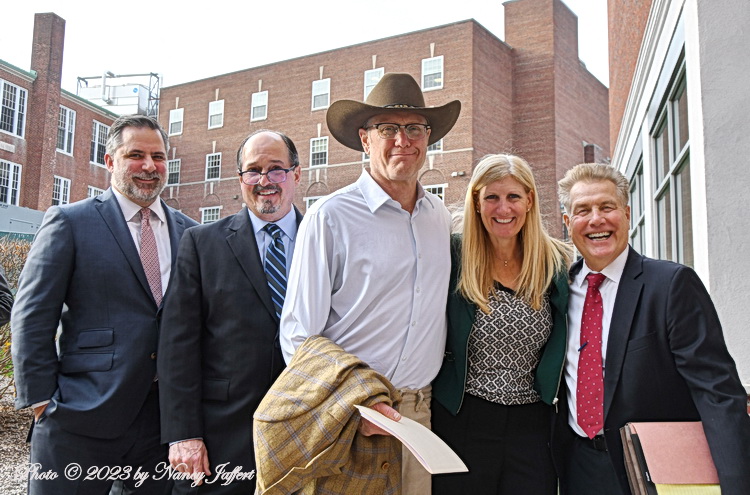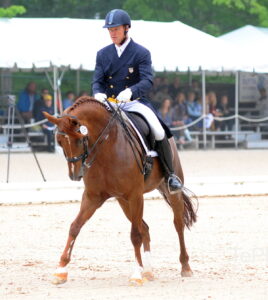Dressage trainer Michael Barisone is writing a book, and now it has a happy ending—except it’s also a beginning.
The first line of the book, he explained, is “I have lived two lives.”
Barisone was given another chance today in court, following more than four harrowing years that started with a shooting, being charged with attempted murder, then ran through a high-profile trial, time in jail and stays in psychiatric institutions.
After getting good reports from psychiatric professionals, Superior Court Judge Stephen Taylor in Morristown, N.J., authorized Barisone’s discharge from Greystone Psychiatric Hospital in Morris Plains, N.J., with certain conditions.
They include having him remain in New Jersey, living at the home of a friend in Whitehouse Station; getting regular treatment from a psychologist in Clinton, no possession of firearms, only an occasional alcoholic beverage and a return to court in three months for an update.
Perhaps most important, Barisone was ordered to have no contact with dressage rider Lauren Kanarek, who nearly died after being shot twice in 2019. Kanarek and her boyfriend, Rob Goodwin, were tenants at Barisone’s horse farm in Long Valley, N.J., where they clashed with ever-increasing intensity, resulting in the shooting when Barisone thought she wanted to kill him.
Barisone was charged with second-degree attempted murder. A jury found him not guilty by reason of insanity last year and he was remanded to the Anne Klein Forensic Center for evaluation before being transferred to Greystone.
The 2008 U.S. Olympic dressage team alternate, who appeared at the courthouse in a brown Stetson and cowboy boots, had more than a dozen supporters accompany him to the courtroom. Some had known him since he first came to New Jersey in 1996.

Michael Barisone and Lara Hausken Osborne with legal team members Andrew Gimigliano, Chris Deininger and Ed Bilinkas. (Photo © 2023 by Nancy Jaffer)
Barisone briefly seemed dazed by the decision at his Krol hearing. That is a proceeding to find whether it is still fair to keep those judged not guilty by reason of insanity out of society, while determining how dangerous they are to themselves and others.
“I don’t really know what to say. I’m sort of on my heels. I don’t know what to expect anymore. I’m out of words,” Barisone said after Taylor’s decision, praising his team of lawyers, Ed Bilinkas, Chris Deininger and Andrew Gimigliano.
Then he quoted a line from rock band Shinedown’s song, Daylight: “It’s amazing what the hard times can reveal; like who shows up, who walks away and who’s for real.”
One of those who is for real is his partner, Lara Hausken Osborne. She had tears in her eyes as she said, “I’m shell-shocked. I’m still holding my breath. I can’t believe it actually happened. I’m so glad. I need him home in Florida.”
She is running a farm that Barisone owns there.
Deininger said, “I believe that the court has reached the correct result. These are very complicated matters, trying to balance society’s interests with an individual’s interests. I don’t think it’s an easy task, and we struck the right balance.”
Taylor listened to testimony from Greystone psychiatrist Dr. Sarah Sheikh and psychologist Dr. Lucas Rockwood about Barisone’s progress since he started working with them and their team at the hospital this year.
Sheikh called Barisone “stable and highly functional,” so he could “step down to a less restrictive environment.” He already spent 21 days out of the hospital, when he was able to go to shops and restaurants, as well as seven nights in a friend’s home.
Patients are taught coping skills about how to handle adverse situations and healthy ways to get their needs met. When Barisone was dealing with Kanarek, he suffered from delusional disorder and believed she was trying to kill him, Lockwood said.
He noted that while Barisone remembers what happened before and after the shooting, he cannot recall anything about the so-called “index incident.”
When certain needs are not met during childhood, Lockwood said, it develops a defeatist perspective. Barisone was abused as a youth, and “made to feel worthless as a child.” He handled that by overcompensating with perfection to counter underlying feelings of inferiority. But at the time of the incident, he didn’t have the coping skills he needed to deal with his issues involving Kanarek and Goodwin, whom he wanted to evict.
Being obsessive-compulsive or having an excessive focus on work are simply character traits, noted Sheikh, saying Barisone is empathetic and has “good impulse control.”
As an example of how Barisone had progressed, Lockwood mentioned when another patient got in his face, he used the “stop skill—stop, take a step back and proceed mindfully,” and then summoned Greystone staff to handle the problem.
Barisone’s delusional issues are in remission now, and he no longer thinks he was acting in self-defense when he encountered Kanarek.
“He says he feels horrible for what he did. He’s glad she survived and wishes the best for her,” Lockwood reported.
When asked what might happen if Barisone would encounter Kanarek, Lockwood replied, “He does not want to see her ever again.”
Queried on the stand whether he saw any risks if Barisone is not held in a secure setting, Lockwood replied, “Not at this time.”
He agreed with Sheikh that Barisone should be released and continue treatment with the private psychologist, since “he does not need the level of treatment from Greystone.”

